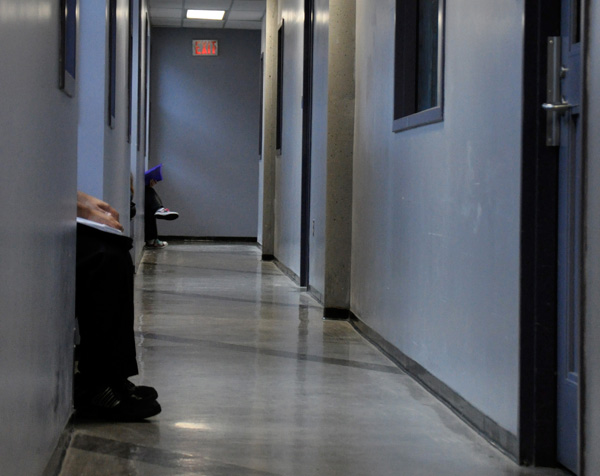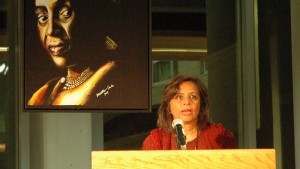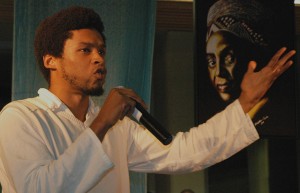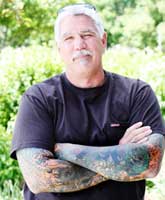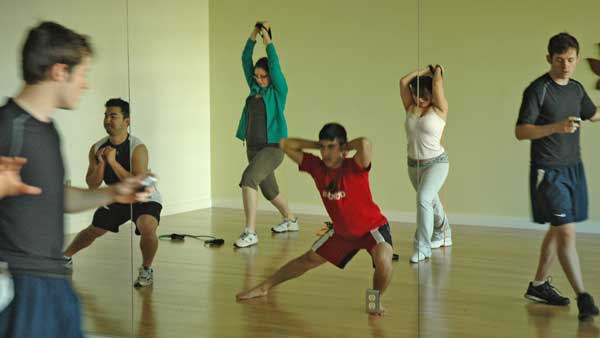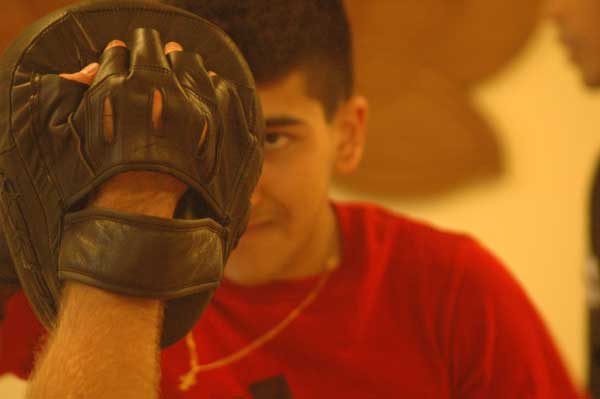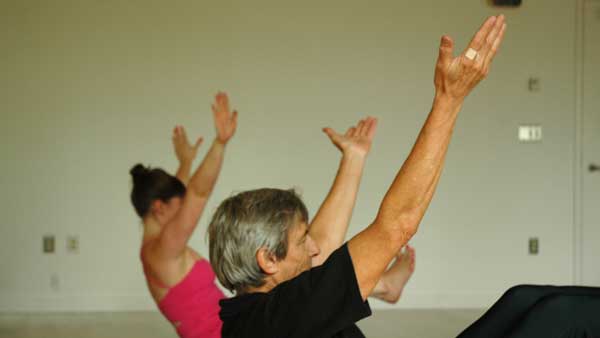Profile: Marc Stokes, busker
December 20, 2010 by Paul Fleischanderl · Leave a Comment
Busker Marc Stokes is seeing the bigger picture in what he does.
“It’s very difficult to stay in an argument with Marc Stokes,” said Anthony Madani. Madani, a hip hop performer and friend of Stokes’, is the creator of the group Musicians United Against Censorship, which is a collection of buskers, as well as musicians who felt censored by the police.
Due to noise complaints from residents, buskers were shut down by the police in spring 2010. Madani and Stokes both said they understand the concerns of the residents and Stokes added, “If you choose to live on the loudest part of Granville Street, I think it’s kind of a ridiculous statement to complain about noise down there.”
In May 2010, Musicians United Against Censorship, protested against the regulations for buskers by blocking Robson Street and making music.
Madani said that Stokes did a lot of organizing for this event and he “is incredibly passionate about his music and he loves performing and making music for people.”
Stokes is a rapper; he also plays the guitar and the saxophone. He got his musical education in elementary and high school and said his most important influences were the people at the Anza Club. There he met “a lot of people with open minds and open hearts, who are willing to teach and learn.”
David Morin is one of these people. He is singer, songwriter, guitarist and producer who is often on stage with Stokes. About Stokes he said, “Marc is very motivated […] He is just a very determined individual so it’s inspiring to work with him.”
The protest concert caught the attention of people from the Downtown Vancouver Business Improvement Association (DVBIA). According to Madani, they liked seeing live music in the streets and how well people reacted to it.
DVBIA took Stokes as a contractor for bringing more music to the streets and, as a result of their work together and with city hall, laws were changed. Busking hours and decibel levels for amplification were extended and more busking areas were created.
Barbara Fairbrother is the event-planning coordinator of DVBIA, who was and is working with Stokes. She said, “I think Marc is very passionate about what he believes in. He is open-minded and willing to listen to different groups and their concerns and I think that’s what helps him work between so many different groups.”
Looking back, Morin sees a transition in the relationship between buskers and police. “First, they [the police] were really hard on us and when they got little bit more used to what was going on they seemed to loosen up on us,” said Morin.
Guitarist Bodhi Jones, who has been a busker for five years, says he never had problems with the police or the city. “As I recall, the bans on busking only started the day the Stokester showed up,” Jones said on the group’s Facebook page in May. “It seems to me that he just likes to talk a lot of shit.”
And, via email, Jones said, “Marc Stokes and his hip hop collective do not speak for me or any of the handful of professional buskers that I’m friends with.“
When confronted with Jones’ quotes, Stokes said, “I think what the concern was a lot of people thought a lot of this was coming from me. […] About what Bodhi said, well, I mean, I’m human and I’m always gonna make mistakes and errors. I don’t know if it is possible to satisfy everybody. But I will try.”
Stokes sees the bigger picture of how life in Vancouver could be someday. He wants the mindsets of people to change. “Maybe some day it doesn’t matter anymore if you drive a BMW. Maybe someday it matters if you’re happy or not.” Stokes said he is not afraid to take the small steps along the way. However, the power for the small and big steps lies in his passion for making music for people.
Stokes in Downtown Vancouver on July 1, 2010. (YouTube video by user woodwardsmile)
Stokes’ website: www.un1music.com
Pictures: Kwantlen without Faces
December 14, 2010 by Paul Fleischanderl · 1 Comment
All students have to write exams, all students have to study. These pictures could show any student’s life. Welcome to an average day at Kwantlen.

Students' feet on the second floor of Kwantlen's Richmond campus on Dec. 7. (Photo by Paul Fleischanderl)
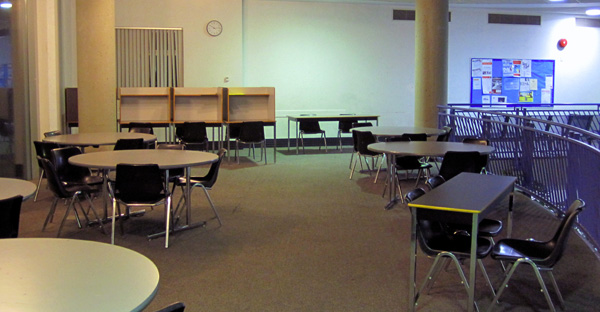
Abandoned second floor at Kwantlen's Richmond Campus on Dec. 6, 10:14 pm. (Photo by Paul Fleischanderl)
Hello Africa: introducing field schools in Kenya and Ghana
November 22, 2010 by Paul Fleischanderl · Leave a Comment
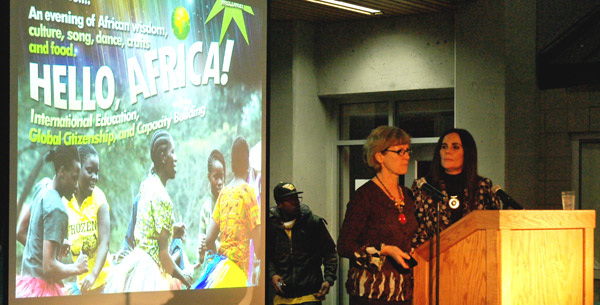
Jessie Horner (left) and Joan Nesbitt, both instructors in Kwantlen's criminology department introduced plans for field schools. (Photo by Paul Fleischanderl)
Hello, Africa, held at the Surrey campus Nov. 15, was about African music and food — and announcement of plans that could see Kwantlen students studying at field schools in Ghana and Kenya.
Criminology instructors Joan Nesbitt and Jessie Horner introduced plans for the field schools. “The field schools are an attempt to learn from one another in approach to become world citizens,” Nesbitt said.
Nesbitt and Horner went to Kenya last summer with Dr. Charles Quist-Adade as planning for a field school in Africa got under way. The current plans include an eight- to 10-week course for Kwantlen students in May 2012, worth between six and nine credits. The first two weeks would consist of preparation for Africa at Kwantlen. While in Africa, students would attend prospective partner schools Moi University in Eldoret, Kenyatta University near Nairobi or the University of Nairobi, all located in Kenya. The costs for participating in the field school in spring 2012 will be around $5,000 per student.
The reason for choosing Kenya as a destination is that there is already a relationship with Masinde Muliro University of Science and Technology there. Also, the field school might be a case study in development and it is supported through the Canadian International Development Agency (CIDA).
Horner and Nesbitt were concerned with the lack of Kenya or even African content that Kenyan criminology students study from. Horner and Nesbitt fear that without such a Kenya-based program, the schools run the risk of “re-colonizing” students with Western ideas and systems of thought.
The event’s keynote speaker was Prof. Kogila Moodley, professor of sociology at UBC who focusses on multiculturalism and race relations. In her speech, she compared Ghandi and Mandela and posed the idea that non-violent resistance may have been uniquely successful in Gandhi’s case.
The event also featured the African percussion band Zion Dancers, poet Scruffmouth, music, singing as well as African food such as peanut curry soup, green curry stew with potatoes and spicy pitas with a red rooibos tea latte.
Kwantlen students who wish to participate in a field school, can attend one in July 2011. The Ghana field school experience is transferable for six credits at Kwantlen, and lasts for three weeks. For details and registration see Dr. Charles Quist-Adade, instructor in the sociology department.
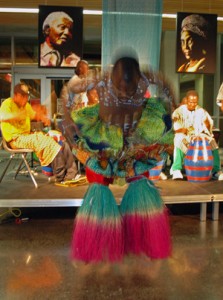
Zion Dancers played traditional African music at the event, prompting the crowd to get up and join in the dancing. Photo by Jeff Groat
Video: Kwantlen hosts Diwali Festival of Light
November 6, 2010 by Paul Fleischanderl · Leave a Comment
The Diwali Festival of Light came to all four Kwantlen campuses from Nov. 2-5. The event, hosted by the KSA, had food, music, henna tattoos, turban-tying and intercultural education. The video was produced at Surrey campus by Lucas Meneses-Skoda, Brittany Tiplady and Paul Fleischanderl.
Co-operative Education drops by Lululemon Athletica
October 26, 2010 by Paul Fleischanderl · Leave a Comment
Staff and faculty from Kwantlen met with staff and leaders from Lululemon Athletica at Oakridge Centre last week To discuss and exchange ideas for co-operation.
From now on, Lululemon Athelica is one of the employers in Kwantlen’s Co-operative Education Program. The two-year program combines on-campus study with one semester of paid, career-related work experience./p>
“During this semester, students work at a job in their typical field where they can apply their theoretical knowledge. Also, students get in contact with employers,” said Caitlin Stiles, co-op coordinator at Kwantlen.
So far, Kwantlen offers co-op for students of Computer Information Systems, Environmental Protection Technology, the Marketing Management Diploma, Bachelor of Technology in Information Technology, Bachelor of Business Administration (BBA) in Entrepreneurial Leadership and BBA in Accounting.
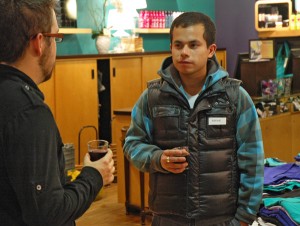
Hector Cabrera, key leader, floor manager and reatail on boarding trainer of Lululemon's Oakridge store. (Photo by Paul Fleischanderl)
For Lululemon co-operation with Kwantlen is no way of recruiting staff, said Hector Cabrera, who is key manager, floor manager and retail trainer.
“We want to get in touch with young, vibrant people in the community that want to make a difference and don’t really know how. We give them resources to do that and create what they want,” Cabrera said.
There is no typical hierarchy at Lululemon Athletica. Each store is independent and the mission statement for each is different.
“We don’t do our business for the sake of profits right away: It’s about what can we do to establish a relationship with the people in our community. When people see that, they get gravitated towards the brand and to what the company means and what it’s about and that makes us successful on the long haul,” said Cabrera.
Lululemon wants to extend the relationship with Kwantlen, Cabera said. “This hasn’t to be bureaucratic; it’s as easy as an conversation. People are people and that’s why it’s great to partner up with a school that sees it that way as well.”
This is just the start and coordinators at Kwantlen’s Career Services and Co-op, as well as staff at Lululemon Athletica, are looking forward to see how things will evolve. What happens next depends on the students.
To see if your program has an option for co-op and for more information, go to www.kwantlen.ca/coop.
Speaking Session in Surrey: Don’t follow Rick Osborne’s path
October 4, 2010 by Paul Fleischanderl · Leave a Comment
Rick Osborne will be speaking about his about his real-life experiences with criminal activities, drug abuse and two decades in penitentiaries on Wednesday, Oct. 6 at the Surrey campus.
Who is Rick Osborne?
As a teenager in Ontario, Osborne fell in with the wrong crowd and drug addiction and street gang involvement ensued. At 21, he was a full-patch member of one of the world’s largest and powerful outlaw motorcycle clubs. Because of his criminal activity, he entered the federal penitentiary system and spend more than 24 years of his life — longer than most of Kwantlen’s students have been in this world — in penitentiaries all over Canada.
During his imprisonment he kick his drug addiction and parted with his gang life. While a federal inmate in maximum security, Osborne earned his bachelor degree in psychology from Queens University.
Since he left prison in 1993, he has travelled across Canada sharing his experiences about the dangers of gangs, drugs and criminal activity with kids and youth to prevent them following his path.
In 2008, he joined Astwood Strategy Corporation and the mentorship program Ozzy’s Garage was established. In this intervention program, at-risk kids build custom motorcycle choppers with Osborne and benefit from his experiences as a gang member.
His presentation, at 4 p.m., in room D128, is not just for Kwantlen students. “Any community member who is interested will be able to take away something from this session,” said Rob Rai, manager of Surrey Wrap Program and assistant manager of Safe Schools.
Osborne will tell how he got past his drug addiction and was able to break with his life in a gang. “It will be a combination of his journey and of his work with kids at Ozzy’s Garage”, said Rai. Osborne’s presentation is followed by questions and discussion. Admission is free.
The Speaking Session is hosted in collaboration with Safe Schools, Acting Together and the Centre for Interdisciplinary Research: Community Learning and Engagement.
KSA intramurals at Kwantlen’s Richmond campus
October 3, 2010 by Paul Fleischanderl · Leave a Comment
KSA offers at Kwantlen’s Richmond Campus five fitness classes: Yoga, Boot Camp Circuit Training, Kickboxing, Group Groove and Group Centregy. All classes are held at the Blossoming Lotus Studio (Room 1320) in Richmond. Membership is $25/30 a month, drop-in purchases are available at KSA Member Services.
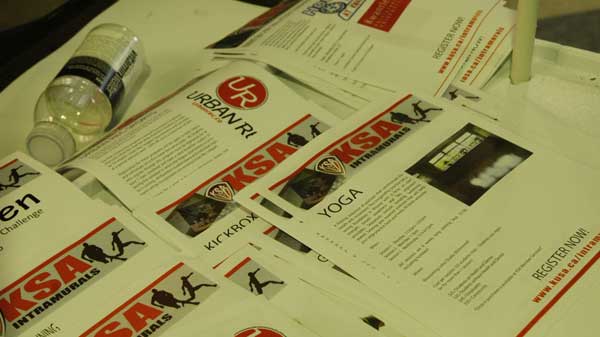
One of KSA's information desks with flyers for this semester's intramurals. (Photo by Paul Fleischanderl)

Eddie Lee with an elastic band, instructor Travis Tomlin is blurred in the background. (Photo by Paul Fleischanderl)
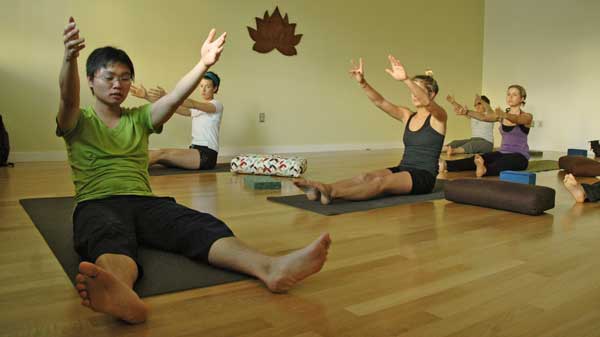
David Yao's yoga class in the Blossoming Lotus Studio on Wednesdays 5:15pm to 6:15pm. (Photo by Paul Fleischanderl)

Movement at Yao's yoga class. The first 30 minutes of the class are active... (Photo by Paul Fleischanderl)
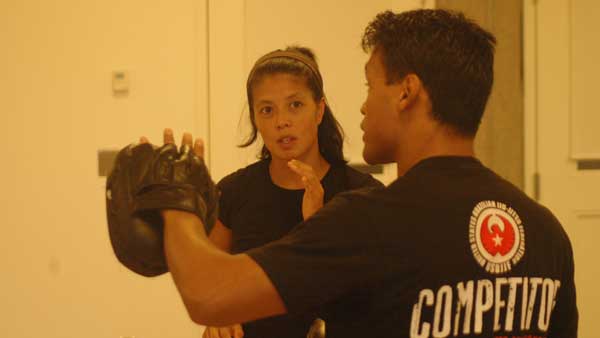
Kickboxing instructors Milo and Marcy Hilario show movements and combinations in their Monday class (4pm - 5pm). There is a second session on Wednesdays. (Photo by Paul Fleischanderl)

Participants at Kickboxing train in there bare feet and sport clothes. (Photo by Paul Fleischanderl)

Yoga instructor Miki Tse in a yoga possition during one of her Monday sessions. Session 1 is from 11:55am to 12:55pm, session 2 from 1pm - 2pm. (Photo by Paul Fleischanderl)
Skytrain station names: ‘The next station could be Kwantlen’
September 27, 2010 by Paul Fleischanderl · 4 Comments
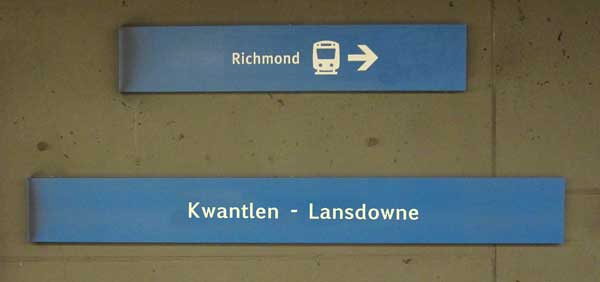
Have you ever wondered why Langara College is mentioned as a Canada Line station name (Langara – 49th Ave), but Kwantlen isn’t?
At the Communication & Marketing Department of Langara there were no answers. “There was no communication between Translink and Langara. You should ask Translink.”
Ken Hardie, Translink’s director of communications, said that the process of naming the stations involved much discussion. Normally stations are named in a way to orientate people and help them to locate what is nearby. “In the case of Langara, the university is a key destination at this station and therefor mentioned,” he said.
Joanne Saunders, Kwantlen’s Director of Marketing and Communication, wasn’t working at Kwantlen at the time stations were named, but she was told that there was some discussion about the Lansdowne station being named Kwantlen.
“Langara is very lucky to get the free publicity and advertising from the skytrain name,” she said.
But — as both Hardie and Saunders said — the final decision rests with Translink and the latter perceived Kwantlen not to be close enough to warrant inclusion in the station name. “The university isn’t associated with Lansdowne as Langara is with 49th Avenue,” Hardie said.
A little comparison on Google Maps shows that from Langara station to the main entrance of the college it takes six minutes by foot. From Lansdowne to Kwantlen it is eight minutes. Also, both Langara and Kwantlen serve approximately 20,000 students.
But there is hope Hardie said. “If folks from Kwantlen want the university to be mentioned at Lansdowne station we could talk about this.”
What do Kwantlen students (and also residents of Lansdowne) think?
Voting: Should the Lansdowne station be re-named “Kwantlen – Lansdowne”?
A: Yes, definitely!
B: No, I think this is not necessary.
C: I couldn’t care less!
(Leave your answers into the comments)
Profile: Tom Meijer, exchange student
September 18, 2010 by Paul Fleischanderl · 2 Comments
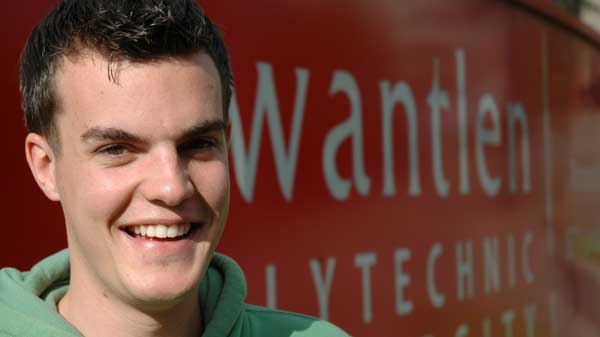
Tom Meijer, 21, is an exchange student from the Netherlands. (Photo by Paul Fleischanderl)
It was his first week of classes at Kwantlen’s Richmond Campus, but he is no freshman. Tom Meijer, 21, is an exchange student from Rotterdam, Netherlands and in his third year of International Business studies.
Meijer is one of Kwantlen’s 34 exchange students in the fall 2010 semester. After this semester, he will be a student in the Netherlands again. His five classes here fit with his program at home, and the credits are transferable. He came to Vancouver because he wanted to do his exchange in an English-speaking country.
“I also think the culture here suits me. It’s quite liberal and open-minded — like me,” he said./p>
Meijer enjoyed his first days at Kwantlen. “I really like the small classes with around 20 students. This way it’s easy to engage with the instructor’s material.”
Class work and the style of teaching are quite similar to his school at home, Meijer said, although one difference is that the instructors here put more effort in engaging the students than they do in Rotterdam.

Taking notes in his business class. (Photo by Paul Fleischanderl)
Being thousands of kilometres away from home doesn’t seem to bother him. Going abroad wasn’t a big decision.
“I chose my studies consciously and I knew that going abroad is part of my program. That’s what I wanted and I would be very disappointed if I would be staying at home now.”
Meijer said that leaving friends and family has been surprisingly easy. A few years back, he saw his brother gaining international experience and enjoying it. So he knew what was coming to him and — more important — he knew what the experience is worth.
At first, one needs courage to leave the comfort-zone of home, Meijer thinks. “If you do so, you try new things and you meet new people. You challenge yourself and become more.”
The new culture was at first awkward but he settled in quite fast and got used to it, he said.
His first day was a difficult one. Back then, he had to find a room and the place where he first stayed was still under construction. He couldn’t rest enough to get rid of his jetlag. So he went for a walk.
He discovered Vancouver bit by bit and he would recommend to everyone who is new to a city to explore it at first by foot at one’s own pace.
Especially at the beginning of an exchange, student’s social contacts to friends and family at home can help. “Writing e-mails and posting on Facebook is daily stuff,” he said. As well, once a week Meijer talks to his parents on Skype.
Although he will be away from home for five months, he’s not afraid to lose his connections to people at home. “My friends know I miss them, and I know they miss me. A couple of months won’t change anything.”

Meijer likes the small size of classes at Kwantlen. (Photo by Paul Fleischanderl)
In most of his classes, Meijer is the only exchange student, which means a lot of new faces and acquaintances.
“People here are interested in who I am. But it’s mostly politeness and small talk. Everyone has their own life and their social circles,” he said.
Meijer wants to get to know the people here, but he thinks they aren’t easy to approach. He knows that it how acquaintances will perceive him depends on his attitude, and that he has to make the first step.
Every semester thousands of students like Meijer all around the world experience life, joy and adjusting abroad. But Europeans seem more likely to go abroad than Canadians. Numbers from Internationalization in education in the Netherlands from 2008/2009 show more than 40,000 Dutch students abroad. Data from the Association of University and Colleges in Canada’s from 2007 shows that there are roughly 18,000 Canadian students abroad in 2006/2007. (These numbers combine exchange and international students.)




